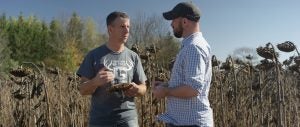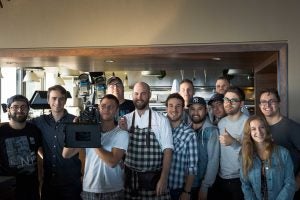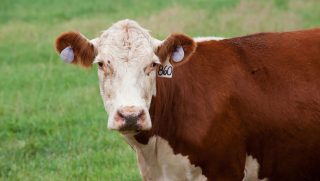Follow the food.
When the creator of “Before The Plate” sought out a chef to be featured in the documentary, the path led him to John Horne and the kitchen he runs at the upscale Canoe restaurant in downtown Toronto.
The documentary project takes a single plate of food and tracks its individual ingredients back to the farms from where they came — sometimes they were grown on conventional farms, other times from organic ones.
Horne, who’s 40 and the district executive chef for about half a dozen restaurants, grew up on a farm north of Toronto. His family there still owns the original family homestead that dates to the 1800s, which has been whittled down to about 600 acres that focuses on beef, pork, chicken, squash, corn, and potatoes.
“I spend a lot of time on the farm. I love being there,” he said.

We talked with Horne about his experiences visiting farms and being a focal point of the documentary, which premieres August 5.
AGDAILY: How did you get started working on this project?
HORNE: It came through Peter Oliver, one of the owners of Oliver & Bonacini. He knows Dylan [Sher, the filmmaker]. They were looking to get connected with a well-known restaurant to get going on the movie. So Peter and our head of marketing approached me about whether I would be comfortable doing this. I said I’d be willing to meet them and go from there. I wasn’t expecting the documentary to be as big as it turned out to be, so it’s been a fantastic surprise.
AGDAILY: How has your understanding of our farm-to-table food system evolved based on your experience with the film?
HORNE: Going into it, I felt like I had a pretty good knowledge of everything. There’s so much material out there that you see on TV or in newspapers, you end up getting these false pictures about what’s going on. That can relate to GMOs or how antibiotics or hormones are used. It’s so often one-sided, and people can become jaded because they don’t get a true perspective. So this experience opened my eyes to a lot of things and made me realize that I had been wrong about some of it. Sometimes I had been very against something, and this made me step back, and hold on a moment as I got the other side of the story — like if GMOs can help us stop using pesticides as much. I don’t know yet the good and the bad with that specifically, but it opened my eyes, and I can dive into that topic more to better understand how I feel.
AGDAILY: It’s hard to have many modern food discussions without mentioning GMOs. Do you feel like genetically engineered foods are the things that most people in the public have the biggest misconceptions about?
HORNE: Yes, a lot of people are skewed on that and don’t necessarily know all the facts. I don’t have answers about whether it’s right or wrong, but people don’t have the full facts on, not 100 percent.
AGDAILY: So being a part of this film project, has this directly impacted the food choices you make in your restaurants?
HORNE: No, because a lot of those choices I was already making. I’ve always tried hard to get connected to local farmers and understand what they’re doing. Very early on while working here at Canoe, I rented a bus and put all the cooks on it and drove them to an organic farm. There, they had to hand-pick three rows of lettuce — 20 cooks took four hours at this. They couldn’t believe how much work it was, and it totally changed their mindset on how those greens were used, very simply they wouldn’t allow lettuces to go to waste. That’s something as a society that we’re horrible at, how much we waste. That was really eye-opening for those kids. I’ve always wanted people to be as educated as they can be about their food.
AGDAILY: Is there one farm you visited during “Before The Plate” that stood out to you in particular?
HORNE: All of the farmers were terrific and had their own points of view. They were all very different. The bees and the honey really stood out to me because I didn’t know that much about bees beforehand. I learned a lot about that and about some of the misconceptions with beehives and the bees dying.
AGDAILY: The world premiere of “Before The Plate” is August 5. What do you hope the audience takes away from the film after they see it?
HORNE: I hope it makes them ask questions. I hope it makes them want to educate themselves. Me being a part of the movie, I wasn’t trying to answer any of these questions or tell people what to do. The point of the movie for me was to be a connection between farmers and the viewers, to open up the lines of communication. I think farmers really want to show what they’re doing and to express what they do and why they do it. But I also think that the consumer has to ask those questions so that they know what they want. It’s about having a better understanding of what’s going on on farms.
“Before The Plate” is a food documentary that premieres August 5, 2018, in Toronto. To connect with “Before The Plate’s” journey, follow them on Facebook and on Instagram and hear first-hand from the filmmaker on AGDAILY.com.

Ryan Tipps is the managing editor for AGDAILY. He has covered farming since 2011, and his writing has been honored by state- and national-level agricultural organizations.



